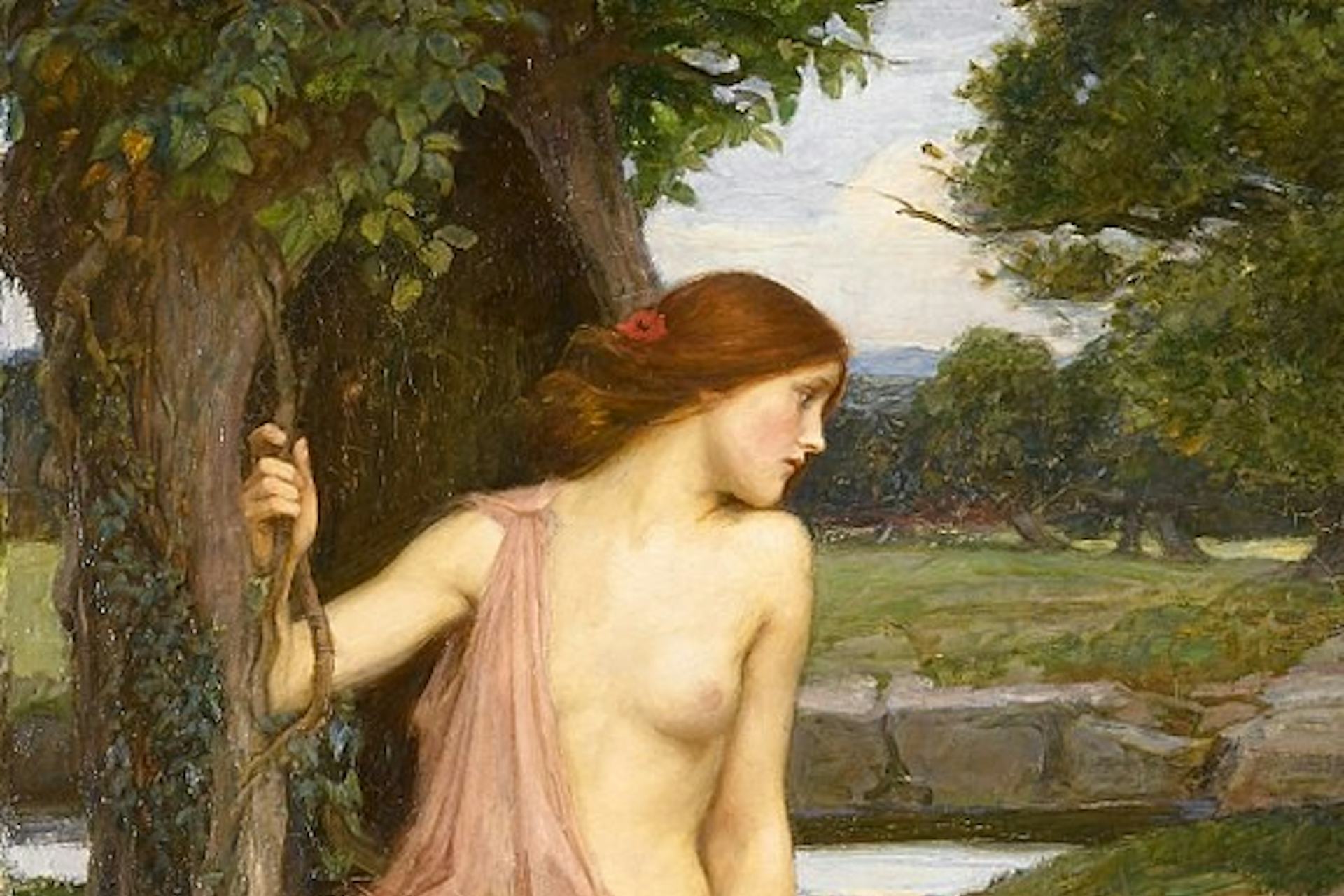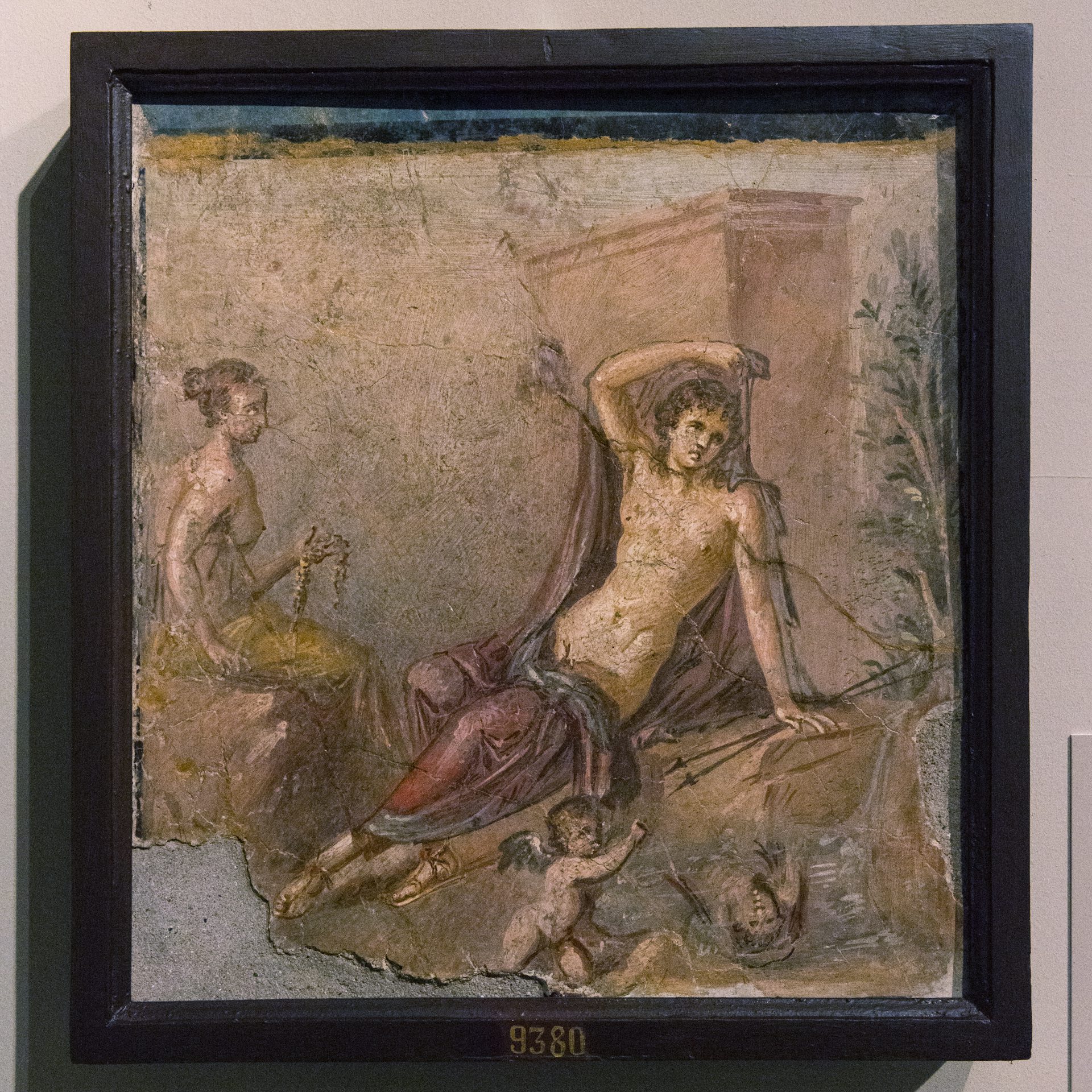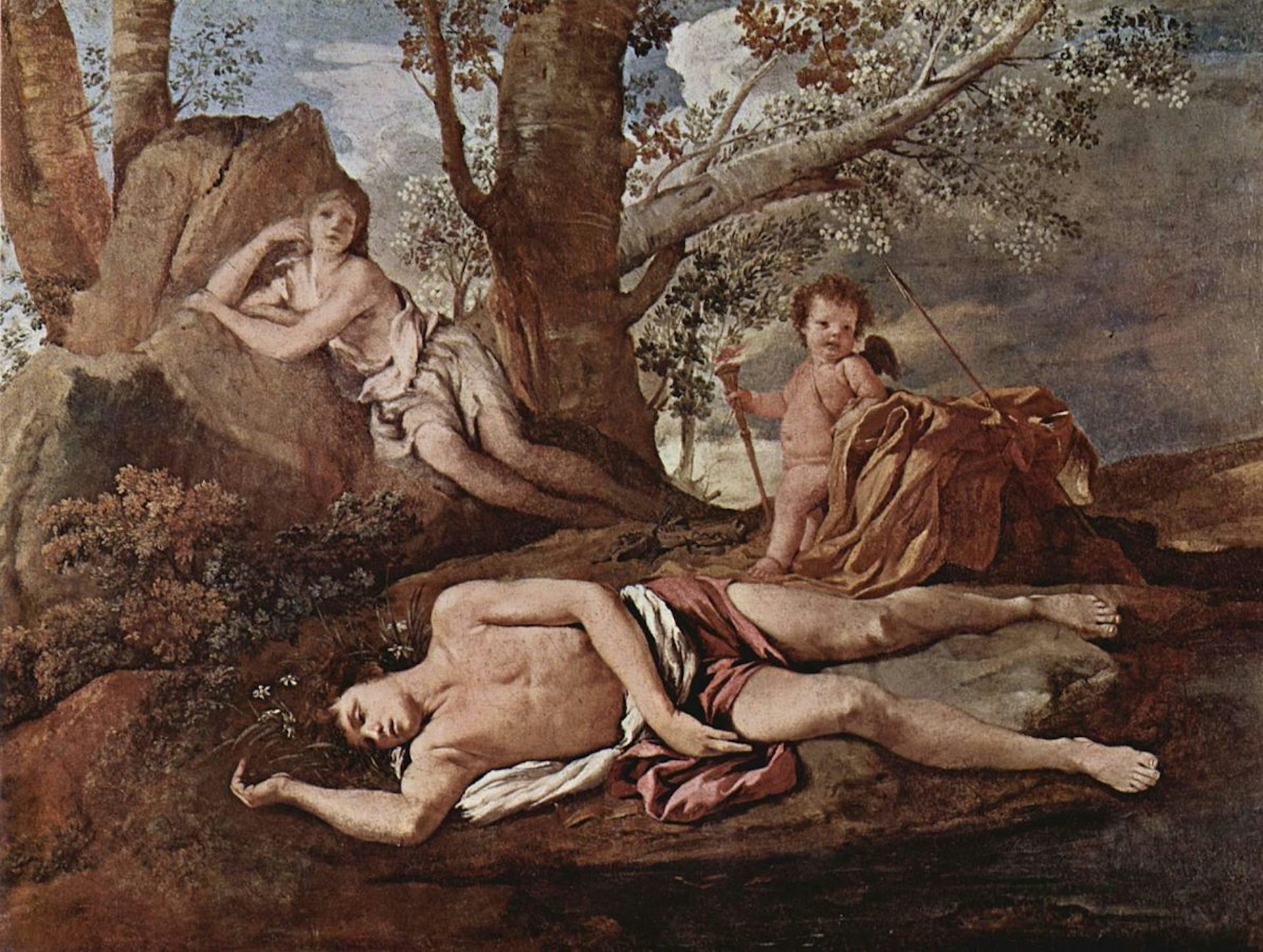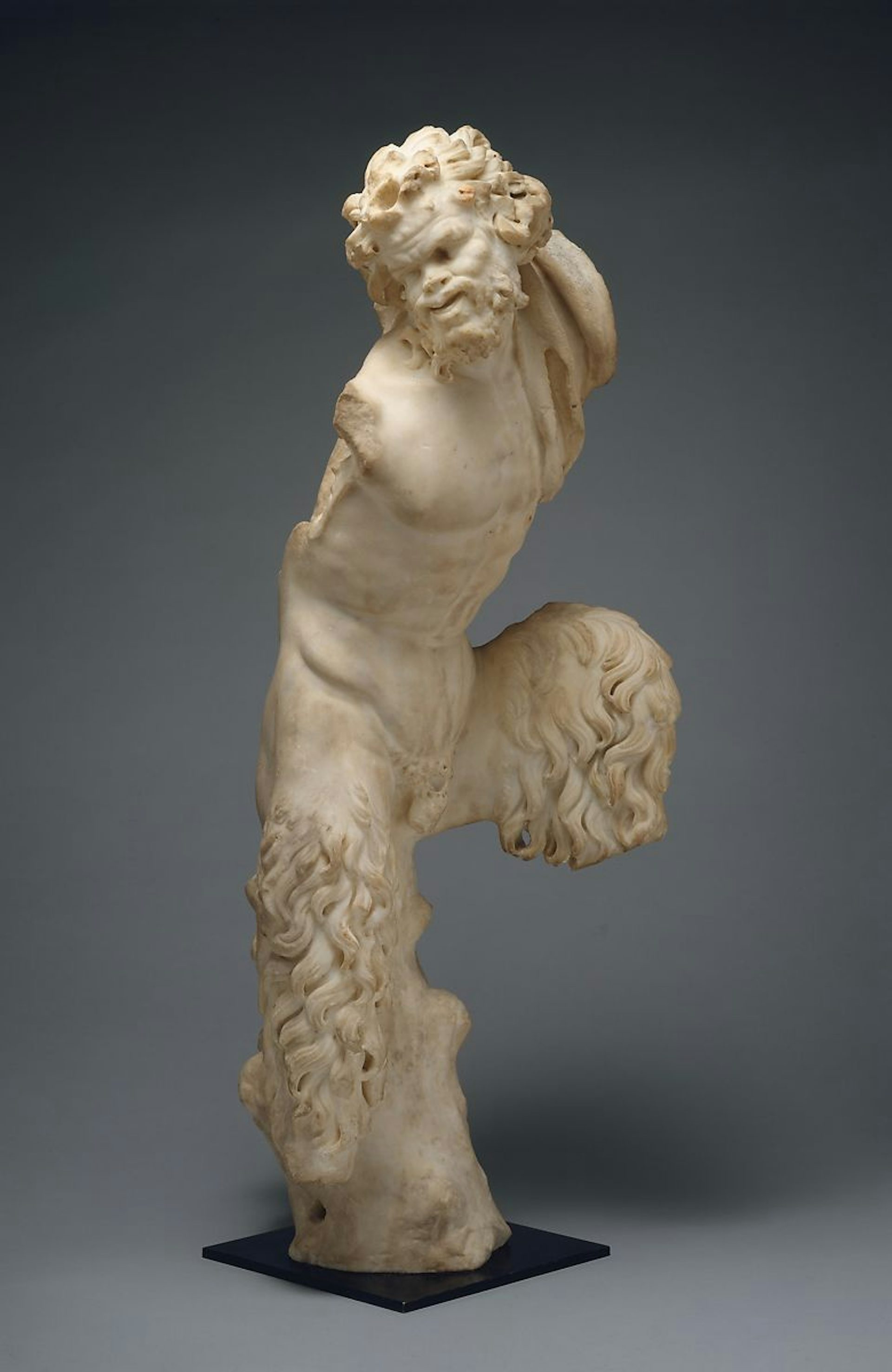Echo

Echo and Narcissus (detail) by John William Waterhouse (1903)
Walker Art Gallery, LiverpoolPublic DomainOverview
Echo was a nymph who lived in the mountains of Boeotia—or, in some versions, the mortal daughter of a woodland nymph and a mortal man. She was the personification of what the Greeks (like us) called “echoes”: the repetition or reverberation of sound. Indeed, Echo’s mythology primarily concerns the origins of the echo.
In one version of her myth, Echo did not return the love of the woodland god Pan; as punishment, Pan had her torn limb from limb so that all that was left of her was her voice.
But the more famous version tells of how Echo helped Zeus hide his affairs with other nymphs by distracting Hera, Zeus’ jealous wife, with her chatter. As punishment, Hera made it so Echo could only repeat words that had already been spoken to her. Without any independent voice of her own, Echo was unable to profess her love for the young Narcissus, and her despair caused her to waste away into nothing but a disembodied voice, forever “echoing” the words of others.
Etymology
The name “Echo” (Greek Ἠχώ, translit. Ēchṓ) was a Greek word meaning “sound,” but it also meant the same thing it does in modern English—“echo.” Indeed, the nymph Echo was a personification of the sonic phenomenon of echoes. Echo’s name is one of several Greek words connected with the noun ἠχή (ēchḗ), meaning “sound, noise”—a word seemingly linked to the Indo-European root *(s)ueh₂tʰ-, also meaning “sound.”[1]
Pronunciation
English
Greek
Echo Ἠχώ (Ēchṓ) Phonetic
IPA
[EK-oh] /ˈɛk oʊ/
Attributes
In most accounts, Echo was a nymph who lived in the mountains of the central Greek region of Boeotia; according to one source, she inhabited Mount Cithaeron.[2] Echo could therefore be classified among the nymphs sometimes called Oreads, or mountain nymphs.
Like other nymphs, Echo assumed the form of a beautiful young woman. Her main individual attribute, however, had to do with her voice. In one version, she was once extremely talkative, but was later deprived of an independent voice by Hera, whom she had offended; she could only “babble and repeat the words, once spoken, over and over.”[3] In another version, Echo was notable for her beautiful singing voice.[4]
Most importantly, however, Echo was the personification of the sonic reverberations known to the ancient Greeks (and to us) as “echoes.” Her mythology, in fact, was largely etiological in nature, meaning it was used to explain the origins of the echo.
Echo was occasionally represented in ancient art. A few famous paintings and statues of her—both on her own as well as with other figures such as Pan—were mentioned by ancient authors.[5] Echo has also been found depicted on frescoes, mosaics, and lamps, especially from the Roman world. In surviving representations, she is most commonly shown together with Narcissus (even though the myth of Echo and Narcissus appears to have been a relatively late development).[6]

Fresco showing Echo and Narcissus, with a small winged Cupid at the bottom center, from Pompeii (ca. 60–79 CE)
National Archaeological Museum, Naples / egisto saniCC BY-NC-SA 2.0Family
Ancient sources did not say much about Echo’s parentage. She was usually represented as a nymph, suggesting that her parents were immortals. But one author, Longus, recounted a version in which Echo was not a nymph at all but rather the daughter of a woodland nymph and a mortal man. Longus’ Echo, though mortal herself, was brought up by the nymphs.[7]
Family Tree
Consorts
Lover
Children
Daughters
- Iambe
- Iynx
Mythology
Echo and the Wrath of Hera
The story of Echo that is best known today actually comes from a relatively late source: Ovid’s Latin epic poem the Metamorphoses, published around 8 CE.
According to Ovid, Echo was a mountain nymph who became embroiled in the marital jealousies of Zeus and Hera, the king and queen of the gods. Zeus, known for his many affairs, would often go to the woods to chase after pretty nymphs. Echo would act as a kind of lookout: when Hera came searching for her husband, Echo would distract her with idle chatter, buying time for her nymph sisters to make their escape.
Naturally, this did not please the vengeful Hera. She punished Echo by taking away her power of independent speech: from now on, Echo would only be able to repeat—or “echo”—the words that others had already spoken to her.[10]
Echo and Narcissus
Ovid’s text goes on to describe how Echo, now without a voice of her own, fell in love with a handsome young man named Narcissus. But she was unable to express her feelings and could only echo his own words back to him. Disgusted, Narcissus rejected Echo.

Echo and Narcissus by Nicholas Poussin (ca. 1630)
Louvre Museum, ParisPublic DomainEcho was crushed and hid herself away. She soon began to fade, until nothing was left of her except for her voice, an eternal echo:
… her miserable body wastes away,
wakeful with sorrows; leanness shrivels up
her skin, and all her lovely features melt,
as if dissolved upon the wafting winds—
nothing remains except her bones and voice—
her voice continues, in the wilderness;
her bones have turned to stone. She lies concealed
in the wild woods, nor is she ever seen
on lonely mountain range; for, though we hear
her calling in the hills, ’tis but a voice,
a voice that lives, that lives among the hills.[11]
Narcissus, meanwhile, was eventually punished for his cruelty. One day he looked into a clear pool of water and saw his handsome reflection. He was immediately smitten—with himself. Unable to tear himself away from his own image, he eventually wasted away and was transformed into the daffodil flower (called “narcissus” by the Greeks).[12]
The Hellenistic Tradition: Echo and Pan
There was another, very different version of Echo’s myth. This version, which involved an unhappy affair between Echo and the god Pan, seems to have taken shape by the Hellenistic period (323–32 BCE)—though it may be even older.
The most complete summary of this tale comes from Longus’ Daphnis and Chloe, a Greek novel probably written around the second century CE. According to Longus, Echo was the mortal daughter of a woodland nymph and was raised by nymphs. She was taught to play many musical instruments and had a beautiful singing voice.

Roman statue of Pan (first century CE), a woodland god who loved Echo
The Metropolitan Museum of ArtPublic DomainIn time, the god Pan fell in love with Echo. Pan was a god of the countryside, woodlands, and herdsmen, known for his very distinctive appearance: he had the torso and face of a man, but the hindquarters, ears, and horns of a goat. Echo refused Pan’s advances, and in revenge, Pan drove the local herdsmen mad and caused them to tear Echo apart limb from limb. Only her beautiful voice remained, forever imitating all sounds.[13]
Other versions of this tradition existed, too. Most of them seem to have ended unhappily (at least for Pan), though not all of them involved such a gruesome fate for Echo. In some accounts, however, Echo and Pan did eventually become lovers and even had children together.[14]
Worship
Echo did not have a traditional cult in antiquity, though some echo halls or grottoes seem to have been dedicated to her—for example, in the cities of Olympia[15] and Hermione.[16]
Pop Culture
The popularity of the myth of Echo—and especially of Echo and Narcissus—continued unabated for centuries. Echo’s tragic love for Narcissus inspired several medieval European poems and romances, and the story remains well known today. Echo has even appeared in some recent adaptations of Greek mythology, including Rick Riordan’s novel The Mark of Athena (2012). In Riordan’s book, as in Ovid’s Metamorphoses, Echo can only repeat words that have already been spoken to her.